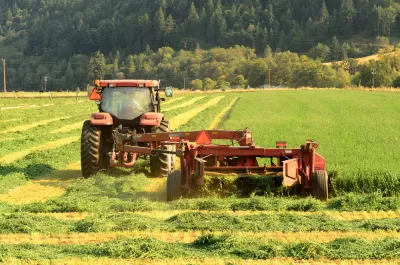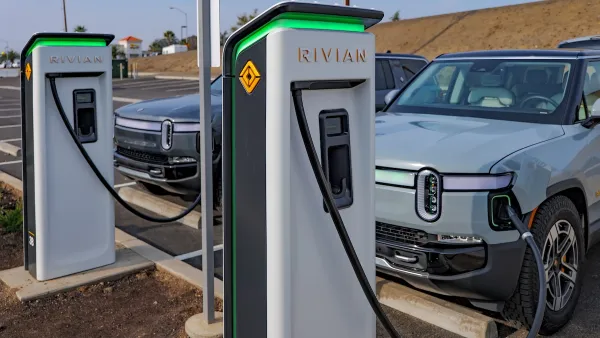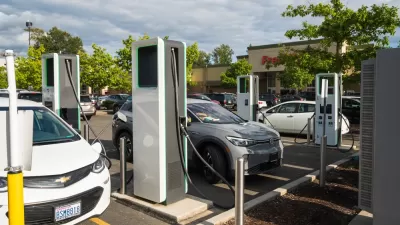Advocates for electrifying farm equipment are calling for more tax incentives and access to electric tractors and other machinery for U.S. farmers.

Pacific Northwest farmers are pushing for electrification in their industry, with one organization bringing “ridershare” service to tractors.
As Claire Carlson reports in the Daily Yonder, “Sustainable Northwest, in partnership with Forth, Wy’East RC&D, and Bonneville Environment Foundation, is leading a ‘rideshare’ program in Oregon that allows farmers to test out electric tractors on their farms.”
The organization hopes the program will help farmers access the benefits of electric equipment. “Rural Oregonians put nearly twice as many daily miles on their vehicles than the statewide average, according to 2019 research prepared for the Oregon Department of Transportation. For farmers, this mileage can be a lot higher, equaling a much steeper price tag on diesel.”
In addition to saving money and fuel, electric farm equipment can bring health benefits. “The minimal sound the machinery creates – a low hum accompanied by the noise of the bearings turning while driving and no noise while idling – is a stark difference from the rumble of diesel-powered tractors.”
“Currently, there are no incentives for electric tractor purchases in Oregon. Sustainable Northwest hopes to change that, and providing a tractor rideshare program free of charge to farmers is just one way they’re doing this.” Advocates hope electric farm equipment will be included in future bills like the Inflation Reduction Act, which includes incentives for some electric vehicles but fails to include equipment such as tractors.
FULL STORY: Push for Electric Ag Equipment in Oregon Is Led by Independent Groups

Maui's Vacation Rental Debate Turns Ugly
Verbal attacks, misinformation campaigns and fistfights plague a high-stakes debate to convert thousands of vacation rentals into long-term housing.

Planetizen Federal Action Tracker
A weekly monitor of how Trump’s orders and actions are impacting planners and planning in America.

Chicago’s Ghost Rails
Just beneath the surface of the modern city lie the remnants of its expansive early 20th-century streetcar system.

Bend, Oregon Zoning Reforms Prioritize Small-Scale Housing
The city altered its zoning code to allow multi-family housing and eliminated parking mandates citywide.

Amtrak Cutting Jobs, Funding to High-Speed Rail
The agency plans to cut 10 percent of its workforce and has confirmed it will not fund new high-speed rail projects.

LA Denies Basic Services to Unhoused Residents
The city has repeatedly failed to respond to requests for trash pickup at encampment sites, and eliminated a program that provided mobile showers and toilets.
Urban Design for Planners 1: Software Tools
This six-course series explores essential urban design concepts using open source software and equips planners with the tools they need to participate fully in the urban design process.
Planning for Universal Design
Learn the tools for implementing Universal Design in planning regulations.
planning NEXT
Appalachian Highlands Housing Partners
Mpact (founded as Rail~Volution)
City of Camden Redevelopment Agency
City of Astoria
City of Portland
City of Laramie





























